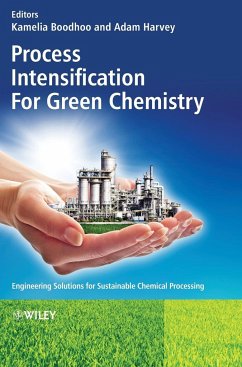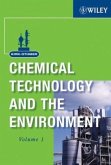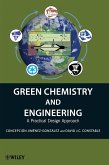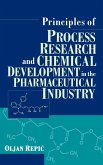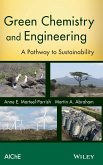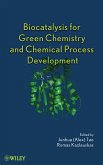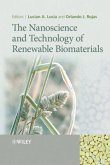Process Intensification Green Chemistry
Herausgegeben von Boodhoo, Kamelia; Harvey, Adam
Process Intensification Green Chemistry
Herausgegeben von Boodhoo, Kamelia; Harvey, Adam
- Gebundenes Buch
- Merkliste
- Auf die Merkliste
- Bewerten Bewerten
- Teilen
- Produkt teilen
- Produkterinnerung
- Produkterinnerung
The successful implementation of greener chemical processes relies not only on the development of more efficient catalysts for synthetic chemistry but also, and as importantly, on the development of reactor and separation technologies which can deliver enhanced processing performance in a safe, cost-effective and energy efficient manner. Process intensification has emerged as a promising field which can effectively tackle the challenges of significant process enhancement, whilst also offering the potential to diminish the environmental impact presented by the chemical industry.
Following an…mehr
Andere Kunden interessierten sich auch für
![Kirk-Othmer Chemical Technology and the Environment, 2 Volume Set Kirk-Othmer Chemical Technology and the Environment, 2 Volume Set]() WileyKirk-Othmer Chemical Technology and the Environment, 2 Volume Set744,99 €
WileyKirk-Othmer Chemical Technology and the Environment, 2 Volume Set744,99 €![Green Chemistry and Engineering Green Chemistry and Engineering]() Concepción Jiménez-GonzálezGreen Chemistry and Engineering116,99 €
Concepción Jiménez-GonzálezGreen Chemistry and Engineering116,99 €![Principles of Process Research and Chemical Development in the Pharmaceutical Industry Principles of Process Research and Chemical Development in the Pharmaceutical Industry]() Oljan RepicPrinciples of Process Research and Chemical Development in the Pharmaceutical Industry196,99 €
Oljan RepicPrinciples of Process Research and Chemical Development in the Pharmaceutical Industry196,99 €![Green Chemistry and Engineering Green Chemistry and Engineering]() Martin A. AbrahamGreen Chemistry and Engineering109,99 €
Martin A. AbrahamGreen Chemistry and Engineering109,99 €![Biocatalysis Green Chemistry Biocatalysis Green Chemistry]() Biocatalysis Green Chemistry164,99 €
Biocatalysis Green Chemistry164,99 €![The Nanoscience and Technology of Renewable Biomaterials The Nanoscience and Technology of Renewable Biomaterials]() The Nanoscience and Technology of Renewable Biomaterials245,99 €
The Nanoscience and Technology of Renewable Biomaterials245,99 €![Citrus Essential Oils Citrus Essential Oils]() Citrus Essential Oils157,99 €
Citrus Essential Oils157,99 €-
-
-
The successful implementation of greener chemical processes relies not only on the development of more efficient catalysts for synthetic chemistry but also, and as importantly, on the development of reactor and separation technologies which can deliver enhanced processing performance in a safe, cost-effective and energy efficient manner. Process intensification has emerged as a promising field which can effectively tackle the challenges of significant process enhancement, whilst also offering the potential to diminish the environmental impact presented by the chemical industry.
Following an introduction to process intensification and the principles of green chemistry, this book presents a number of intensified technologies which have been researched and developed, including case studies to illustrate their application to green chemical processes.
Topics covered include:
Intensified reactor technologies: spinning disc reactors, microreactors, monolith reactors, oscillatory flow reactors, cavitational reactors
Combined reactor/separator systems: membrane reactors, reactive distillation, reactive extraction, reactive absorption
Membrane separations for green chemistry
Industry relevance of process intensification, including economics and environmental impact, opportunities for energy saving, and practical considerations for industrial implementation.
Process Intensification for Green Chemistry is a valuable resource for practising engineers and chemists alike who are interested in applying intensified reactor and/or separator systems in a range of industries to achieve green chemistry principles.
Following an introduction to process intensification and the principles of green chemistry, this book presents a number of intensified technologies which have been researched and developed, including case studies to illustrate their application to green chemical processes.
Topics covered include:
Intensified reactor technologies: spinning disc reactors, microreactors, monolith reactors, oscillatory flow reactors, cavitational reactors
Combined reactor/separator systems: membrane reactors, reactive distillation, reactive extraction, reactive absorption
Membrane separations for green chemistry
Industry relevance of process intensification, including economics and environmental impact, opportunities for energy saving, and practical considerations for industrial implementation.
Process Intensification for Green Chemistry is a valuable resource for practising engineers and chemists alike who are interested in applying intensified reactor and/or separator systems in a range of industries to achieve green chemistry principles.
Produktdetails
- Produktdetails
- Verlag: Wiley & Sons
- 1. Auflage
- Seitenzahl: 432
- Erscheinungstermin: 4. März 2013
- Englisch
- Abmessung: 250mm x 175mm x 28mm
- Gewicht: 919g
- ISBN-13: 9780470972670
- ISBN-10: 047097267X
- Artikelnr.: 35676878
- Verlag: Wiley & Sons
- 1. Auflage
- Seitenzahl: 432
- Erscheinungstermin: 4. März 2013
- Englisch
- Abmessung: 250mm x 175mm x 28mm
- Gewicht: 919g
- ISBN-13: 9780470972670
- ISBN-10: 047097267X
- Artikelnr.: 35676878
Dr Kamelia Boodhoo, Newcastle University, UK. Dr Boodhoo's research in the area of Process Intensification focuses on the development of centrifugal field reactors with particular emphasis on Spinning Disc Reactors. She also has a keen interest in intensification applications involving green chemistry and engineering and renewable resources such as the use of biomass for biopolymers. Dr Boodhoo has been involved in designing and delivering a specialist module on Process Intensification targeted at final year MEng students and MSc students at Newcastle University. For the last two years, she has also been a guest lecturer on the MSc in Green Chemistry and Sustainable Industrial Technology programme at the University of York, teaching "Improved Reactor Designs through Process intensification". Dr Adam Harvey, Newcastle University, UK. Dr Harvey is an active member of the Process Intensification Group at Newcastle. He is a member of the steering committee of the international research network "Process Intensification Network" and co-author of "Process Intensification", published in 2008. He currently lectures on Oscillatory Flow Reactors as part of the Process Intensification module delivered to final year MEng and MSc students.
List of Contributors xiii Preface xv 1 Process Intensification: An Overview
of Principles and Practice 1 Kamelia Boodhoo and Adam Harvey 1.1
Introduction 1 1.2 Process Intensification: Definition and Concept 2 1.3
Fundamentals of Chemical Engineering Operations 3 1.4 Intensification
Techniques 11 1.5 Merits of PI Technologies 21 1.6 Challenges to
Implementation of PI 24 1.7 Conclusion 25 Nomenclature 26 Greek Letters 26
References 27 2 Green Chemistry Principles 33 James Clark, Duncan
Macquarrie, Mark Gronnow and Vitaly Budarin 2.1 Introduction 33 2.2 The
Twelve Principles of Green Chemistry 35 2.3 Metrics for Chemistry 37 2.4
Catalysis and Green Chemistry 41 2.5 Renewable Feedstocks and Biocatalysis
46 2.6 An Overview of Green Chemical Processing Technologies 50 2.7
Conclusion 55 References 55 3 Spinning Disc Reactor: Continuous Thin-film
Flow Processing for Green Chemistry Applications 59 Kamelia Boodhoo 3.1
Introduction 59 3.2 Design and Operating Features of SDRs 60 3.3
Characteristics of SDRs 66 3.4 Case Studies: SDR Application for Green
Chemical Processing and Synthesis 76 3.5 Hurdles to Industry Implementation
84 3.6 Conclusion 86 Nomenclature 87 Greek Letters 87 Subscripts 87
References 87 4 Micro Process Technology and Novel Process Windows - Three
Intensification Fields 91 Svetlana Borukhova and Volker Hessel 4.1
Introduction 91 4.2 Transport Intensification 93 4.3 Chemical
Intensification 108 4.4 Process Design Intensification 128 4.5 Industrial
Microreactor Process Development 137 4.6 Conclusion 140 Acknowledgement 141
References 141 5 Green Chemistry in Oscillatory Baffled Reactors 157 Adam
Harvey 5.1 Introduction 157 5.2 Case Studies: OBR Green Chemistry 164 5.3
Conclusion 170 References 172 6 Monolith Reactors for Intensified
Processing in Green Chemistry 175 Joseph Wood 6.1 Introduction 175 6.2
Design of Monolith Reactors 176 6.3 Hydrodynamics of Monolith Reactors 179
6.4 Advantages of Monolith Reactors 182 6.5 Applications in Green Chemistry
185 6.6 Conclusion 192 Acknowledgement 193 Nomenclature 193 Greek Letters
193 Subscripts and Superscripts 193 References 193 7 Process
Intensification and Green Processing Using Cavitational Reactors 199
Vijayanand Moholkar, Parag Gogate and Aniruddha Pandit 7.1 Introduction 199
7.2 Mechanism of Cavitation-based PI of Chemical Processing 200 7.3 Reactor
Configurations 201 7.4 Mathematical Modelling 207 7.5 Optimization of
Operating Parameters in Cavitational Reactors 209 7.6 Intensification of
Cavitational Activity 211 7.7 Case Studies: Intensification of Chemical
Synthesis using Cavitation 214 7.8 Overview of Intensification and Green
Processing Using Cavitational Reactors 218 7.9 The Future 221 7.10
Conclusion 222 References 222 8 Membrane Bioreactors for Green Processing
in a Sustainable Production System 227 Rosalinda Mazzei, Emma Piacentini,
Enrico Drioli and Lidietta Giorno 8.1 Introduction 227 8.2 Membrane
Bioreactors 228 8.3 Biocatalytic Membrane Reactors 230 8.4 Case Studies:
Membrane Bioreactors 232 8.5 Green Processing Impact of Membrane
Bioreactors 245 8.6 Conclusion 247 References 247 9 Reactive Distillation
251 Anton Kiss 9.1 Introduction 251 9.2 Principles of RD 252 9.3 Design,
Control and Applications 253 9.4 Modelling RD 256 9.5 Economical and
Technical Evaluation 257 9.6 Case Studies: RD 261 9.7 Green Processing
Impact of RD 270 9.8 Conclusion 271 References 271 10 Reactive Extraction
Technology 275 Keat T. Lee and Steven Lim 10.1 Introduction 275 10.2 Case
Studies: Reactive Extraction Technology 277 10.3 Impact on Green Processing
and Process Intensification 284 10.4 Conclusion 286 References 286 11
Reactive Absorption 289 Anton A. Kiss 11.1 Introduction 289 11.2 Theory and
Models 290 11.3 Equipment, Operation and Control 291 11.4 Applications in
Gas Purification 293 11.5 Green Processing Impact of RA 307 11.6 Challenges
and Future Prospects 307 References 307 12 Membrane Separations for Green
Chemistry 311 Rosalinda Mazzei, Emma Piacentini, Enrico Drioli and Lidietta
Giorno 12.1 Introduction 311 12.2 Membranes and Membrane Processes 312 12.3
Case Studies: Membrane Operations in Green Processes 318 12.4 Integrated
Membrane Processes 342 12.5 Green Processing Impact of Membrane Processes
344 12.6 Conclusion 347 References 347 13 Process Intensification in a
Business Context: General Considerations 355 Dag Eimer and Nils Eldrup 13.1
Introduction 355 13.2 The Industrial Setting 356 13.3 Process Case Study
358 13.4 Business Risk and Ideas 366 13.5 Conclusion 367 References 367 14
Process Economics and Environmental Impacts of Process Intensification in
the Petrochemicals, Fine Chemicals and Pharmaceuticals Industries 369 Jan
Harmsen 14.1 Introduction 369 14.2 Petrochemicals Industry 370 14.3 Fine
Chemicals and Pharmaceuticals Industries 376 References 377 15
Opportunities for Energy Saving from Intensified Process Technologies in
the Chemical and Processing Industries 379 Dena Ghiasy and Kamelia Boodhoo
15.1 Introduction 379 15.2 Energy-Intensive Processes in UK Chemical and
Processing Industries 380 15.3 Case Study: Assessment of the Energy Saving
Potential of SDR Technology 383 15.4 Conclusion 389 Nomenclature 390 Greek
Letters 390 Subscripts 390 Appendix: Physical Properties of Styrene,
Toluene and Cooling/Heating Fluids 391 References 391 16 Implementation of
Process Intensification in Industry 393 Jan Harmsen 16.1 Introduction 393
16.2 Practical Considerations for Commercial Implementation 393 16.3 Scope
for Implementation in Various Process Industries 397 16.4 Future Prospects
399 References 399 Index 401
of Principles and Practice 1 Kamelia Boodhoo and Adam Harvey 1.1
Introduction 1 1.2 Process Intensification: Definition and Concept 2 1.3
Fundamentals of Chemical Engineering Operations 3 1.4 Intensification
Techniques 11 1.5 Merits of PI Technologies 21 1.6 Challenges to
Implementation of PI 24 1.7 Conclusion 25 Nomenclature 26 Greek Letters 26
References 27 2 Green Chemistry Principles 33 James Clark, Duncan
Macquarrie, Mark Gronnow and Vitaly Budarin 2.1 Introduction 33 2.2 The
Twelve Principles of Green Chemistry 35 2.3 Metrics for Chemistry 37 2.4
Catalysis and Green Chemistry 41 2.5 Renewable Feedstocks and Biocatalysis
46 2.6 An Overview of Green Chemical Processing Technologies 50 2.7
Conclusion 55 References 55 3 Spinning Disc Reactor: Continuous Thin-film
Flow Processing for Green Chemistry Applications 59 Kamelia Boodhoo 3.1
Introduction 59 3.2 Design and Operating Features of SDRs 60 3.3
Characteristics of SDRs 66 3.4 Case Studies: SDR Application for Green
Chemical Processing and Synthesis 76 3.5 Hurdles to Industry Implementation
84 3.6 Conclusion 86 Nomenclature 87 Greek Letters 87 Subscripts 87
References 87 4 Micro Process Technology and Novel Process Windows - Three
Intensification Fields 91 Svetlana Borukhova and Volker Hessel 4.1
Introduction 91 4.2 Transport Intensification 93 4.3 Chemical
Intensification 108 4.4 Process Design Intensification 128 4.5 Industrial
Microreactor Process Development 137 4.6 Conclusion 140 Acknowledgement 141
References 141 5 Green Chemistry in Oscillatory Baffled Reactors 157 Adam
Harvey 5.1 Introduction 157 5.2 Case Studies: OBR Green Chemistry 164 5.3
Conclusion 170 References 172 6 Monolith Reactors for Intensified
Processing in Green Chemistry 175 Joseph Wood 6.1 Introduction 175 6.2
Design of Monolith Reactors 176 6.3 Hydrodynamics of Monolith Reactors 179
6.4 Advantages of Monolith Reactors 182 6.5 Applications in Green Chemistry
185 6.6 Conclusion 192 Acknowledgement 193 Nomenclature 193 Greek Letters
193 Subscripts and Superscripts 193 References 193 7 Process
Intensification and Green Processing Using Cavitational Reactors 199
Vijayanand Moholkar, Parag Gogate and Aniruddha Pandit 7.1 Introduction 199
7.2 Mechanism of Cavitation-based PI of Chemical Processing 200 7.3 Reactor
Configurations 201 7.4 Mathematical Modelling 207 7.5 Optimization of
Operating Parameters in Cavitational Reactors 209 7.6 Intensification of
Cavitational Activity 211 7.7 Case Studies: Intensification of Chemical
Synthesis using Cavitation 214 7.8 Overview of Intensification and Green
Processing Using Cavitational Reactors 218 7.9 The Future 221 7.10
Conclusion 222 References 222 8 Membrane Bioreactors for Green Processing
in a Sustainable Production System 227 Rosalinda Mazzei, Emma Piacentini,
Enrico Drioli and Lidietta Giorno 8.1 Introduction 227 8.2 Membrane
Bioreactors 228 8.3 Biocatalytic Membrane Reactors 230 8.4 Case Studies:
Membrane Bioreactors 232 8.5 Green Processing Impact of Membrane
Bioreactors 245 8.6 Conclusion 247 References 247 9 Reactive Distillation
251 Anton Kiss 9.1 Introduction 251 9.2 Principles of RD 252 9.3 Design,
Control and Applications 253 9.4 Modelling RD 256 9.5 Economical and
Technical Evaluation 257 9.6 Case Studies: RD 261 9.7 Green Processing
Impact of RD 270 9.8 Conclusion 271 References 271 10 Reactive Extraction
Technology 275 Keat T. Lee and Steven Lim 10.1 Introduction 275 10.2 Case
Studies: Reactive Extraction Technology 277 10.3 Impact on Green Processing
and Process Intensification 284 10.4 Conclusion 286 References 286 11
Reactive Absorption 289 Anton A. Kiss 11.1 Introduction 289 11.2 Theory and
Models 290 11.3 Equipment, Operation and Control 291 11.4 Applications in
Gas Purification 293 11.5 Green Processing Impact of RA 307 11.6 Challenges
and Future Prospects 307 References 307 12 Membrane Separations for Green
Chemistry 311 Rosalinda Mazzei, Emma Piacentini, Enrico Drioli and Lidietta
Giorno 12.1 Introduction 311 12.2 Membranes and Membrane Processes 312 12.3
Case Studies: Membrane Operations in Green Processes 318 12.4 Integrated
Membrane Processes 342 12.5 Green Processing Impact of Membrane Processes
344 12.6 Conclusion 347 References 347 13 Process Intensification in a
Business Context: General Considerations 355 Dag Eimer and Nils Eldrup 13.1
Introduction 355 13.2 The Industrial Setting 356 13.3 Process Case Study
358 13.4 Business Risk and Ideas 366 13.5 Conclusion 367 References 367 14
Process Economics and Environmental Impacts of Process Intensification in
the Petrochemicals, Fine Chemicals and Pharmaceuticals Industries 369 Jan
Harmsen 14.1 Introduction 369 14.2 Petrochemicals Industry 370 14.3 Fine
Chemicals and Pharmaceuticals Industries 376 References 377 15
Opportunities for Energy Saving from Intensified Process Technologies in
the Chemical and Processing Industries 379 Dena Ghiasy and Kamelia Boodhoo
15.1 Introduction 379 15.2 Energy-Intensive Processes in UK Chemical and
Processing Industries 380 15.3 Case Study: Assessment of the Energy Saving
Potential of SDR Technology 383 15.4 Conclusion 389 Nomenclature 390 Greek
Letters 390 Subscripts 390 Appendix: Physical Properties of Styrene,
Toluene and Cooling/Heating Fluids 391 References 391 16 Implementation of
Process Intensification in Industry 393 Jan Harmsen 16.1 Introduction 393
16.2 Practical Considerations for Commercial Implementation 393 16.3 Scope
for Implementation in Various Process Industries 397 16.4 Future Prospects
399 References 399 Index 401
List of Contributors xiii Preface xv 1 Process Intensification: An Overview
of Principles and Practice 1 Kamelia Boodhoo and Adam Harvey 1.1
Introduction 1 1.2 Process Intensification: Definition and Concept 2 1.3
Fundamentals of Chemical Engineering Operations 3 1.4 Intensification
Techniques 11 1.5 Merits of PI Technologies 21 1.6 Challenges to
Implementation of PI 24 1.7 Conclusion 25 Nomenclature 26 Greek Letters 26
References 27 2 Green Chemistry Principles 33 James Clark, Duncan
Macquarrie, Mark Gronnow and Vitaly Budarin 2.1 Introduction 33 2.2 The
Twelve Principles of Green Chemistry 35 2.3 Metrics for Chemistry 37 2.4
Catalysis and Green Chemistry 41 2.5 Renewable Feedstocks and Biocatalysis
46 2.6 An Overview of Green Chemical Processing Technologies 50 2.7
Conclusion 55 References 55 3 Spinning Disc Reactor: Continuous Thin-film
Flow Processing for Green Chemistry Applications 59 Kamelia Boodhoo 3.1
Introduction 59 3.2 Design and Operating Features of SDRs 60 3.3
Characteristics of SDRs 66 3.4 Case Studies: SDR Application for Green
Chemical Processing and Synthesis 76 3.5 Hurdles to Industry Implementation
84 3.6 Conclusion 86 Nomenclature 87 Greek Letters 87 Subscripts 87
References 87 4 Micro Process Technology and Novel Process Windows - Three
Intensification Fields 91 Svetlana Borukhova and Volker Hessel 4.1
Introduction 91 4.2 Transport Intensification 93 4.3 Chemical
Intensification 108 4.4 Process Design Intensification 128 4.5 Industrial
Microreactor Process Development 137 4.6 Conclusion 140 Acknowledgement 141
References 141 5 Green Chemistry in Oscillatory Baffled Reactors 157 Adam
Harvey 5.1 Introduction 157 5.2 Case Studies: OBR Green Chemistry 164 5.3
Conclusion 170 References 172 6 Monolith Reactors for Intensified
Processing in Green Chemistry 175 Joseph Wood 6.1 Introduction 175 6.2
Design of Monolith Reactors 176 6.3 Hydrodynamics of Monolith Reactors 179
6.4 Advantages of Monolith Reactors 182 6.5 Applications in Green Chemistry
185 6.6 Conclusion 192 Acknowledgement 193 Nomenclature 193 Greek Letters
193 Subscripts and Superscripts 193 References 193 7 Process
Intensification and Green Processing Using Cavitational Reactors 199
Vijayanand Moholkar, Parag Gogate and Aniruddha Pandit 7.1 Introduction 199
7.2 Mechanism of Cavitation-based PI of Chemical Processing 200 7.3 Reactor
Configurations 201 7.4 Mathematical Modelling 207 7.5 Optimization of
Operating Parameters in Cavitational Reactors 209 7.6 Intensification of
Cavitational Activity 211 7.7 Case Studies: Intensification of Chemical
Synthesis using Cavitation 214 7.8 Overview of Intensification and Green
Processing Using Cavitational Reactors 218 7.9 The Future 221 7.10
Conclusion 222 References 222 8 Membrane Bioreactors for Green Processing
in a Sustainable Production System 227 Rosalinda Mazzei, Emma Piacentini,
Enrico Drioli and Lidietta Giorno 8.1 Introduction 227 8.2 Membrane
Bioreactors 228 8.3 Biocatalytic Membrane Reactors 230 8.4 Case Studies:
Membrane Bioreactors 232 8.5 Green Processing Impact of Membrane
Bioreactors 245 8.6 Conclusion 247 References 247 9 Reactive Distillation
251 Anton Kiss 9.1 Introduction 251 9.2 Principles of RD 252 9.3 Design,
Control and Applications 253 9.4 Modelling RD 256 9.5 Economical and
Technical Evaluation 257 9.6 Case Studies: RD 261 9.7 Green Processing
Impact of RD 270 9.8 Conclusion 271 References 271 10 Reactive Extraction
Technology 275 Keat T. Lee and Steven Lim 10.1 Introduction 275 10.2 Case
Studies: Reactive Extraction Technology 277 10.3 Impact on Green Processing
and Process Intensification 284 10.4 Conclusion 286 References 286 11
Reactive Absorption 289 Anton A. Kiss 11.1 Introduction 289 11.2 Theory and
Models 290 11.3 Equipment, Operation and Control 291 11.4 Applications in
Gas Purification 293 11.5 Green Processing Impact of RA 307 11.6 Challenges
and Future Prospects 307 References 307 12 Membrane Separations for Green
Chemistry 311 Rosalinda Mazzei, Emma Piacentini, Enrico Drioli and Lidietta
Giorno 12.1 Introduction 311 12.2 Membranes and Membrane Processes 312 12.3
Case Studies: Membrane Operations in Green Processes 318 12.4 Integrated
Membrane Processes 342 12.5 Green Processing Impact of Membrane Processes
344 12.6 Conclusion 347 References 347 13 Process Intensification in a
Business Context: General Considerations 355 Dag Eimer and Nils Eldrup 13.1
Introduction 355 13.2 The Industrial Setting 356 13.3 Process Case Study
358 13.4 Business Risk and Ideas 366 13.5 Conclusion 367 References 367 14
Process Economics and Environmental Impacts of Process Intensification in
the Petrochemicals, Fine Chemicals and Pharmaceuticals Industries 369 Jan
Harmsen 14.1 Introduction 369 14.2 Petrochemicals Industry 370 14.3 Fine
Chemicals and Pharmaceuticals Industries 376 References 377 15
Opportunities for Energy Saving from Intensified Process Technologies in
the Chemical and Processing Industries 379 Dena Ghiasy and Kamelia Boodhoo
15.1 Introduction 379 15.2 Energy-Intensive Processes in UK Chemical and
Processing Industries 380 15.3 Case Study: Assessment of the Energy Saving
Potential of SDR Technology 383 15.4 Conclusion 389 Nomenclature 390 Greek
Letters 390 Subscripts 390 Appendix: Physical Properties of Styrene,
Toluene and Cooling/Heating Fluids 391 References 391 16 Implementation of
Process Intensification in Industry 393 Jan Harmsen 16.1 Introduction 393
16.2 Practical Considerations for Commercial Implementation 393 16.3 Scope
for Implementation in Various Process Industries 397 16.4 Future Prospects
399 References 399 Index 401
of Principles and Practice 1 Kamelia Boodhoo and Adam Harvey 1.1
Introduction 1 1.2 Process Intensification: Definition and Concept 2 1.3
Fundamentals of Chemical Engineering Operations 3 1.4 Intensification
Techniques 11 1.5 Merits of PI Technologies 21 1.6 Challenges to
Implementation of PI 24 1.7 Conclusion 25 Nomenclature 26 Greek Letters 26
References 27 2 Green Chemistry Principles 33 James Clark, Duncan
Macquarrie, Mark Gronnow and Vitaly Budarin 2.1 Introduction 33 2.2 The
Twelve Principles of Green Chemistry 35 2.3 Metrics for Chemistry 37 2.4
Catalysis and Green Chemistry 41 2.5 Renewable Feedstocks and Biocatalysis
46 2.6 An Overview of Green Chemical Processing Technologies 50 2.7
Conclusion 55 References 55 3 Spinning Disc Reactor: Continuous Thin-film
Flow Processing for Green Chemistry Applications 59 Kamelia Boodhoo 3.1
Introduction 59 3.2 Design and Operating Features of SDRs 60 3.3
Characteristics of SDRs 66 3.4 Case Studies: SDR Application for Green
Chemical Processing and Synthesis 76 3.5 Hurdles to Industry Implementation
84 3.6 Conclusion 86 Nomenclature 87 Greek Letters 87 Subscripts 87
References 87 4 Micro Process Technology and Novel Process Windows - Three
Intensification Fields 91 Svetlana Borukhova and Volker Hessel 4.1
Introduction 91 4.2 Transport Intensification 93 4.3 Chemical
Intensification 108 4.4 Process Design Intensification 128 4.5 Industrial
Microreactor Process Development 137 4.6 Conclusion 140 Acknowledgement 141
References 141 5 Green Chemistry in Oscillatory Baffled Reactors 157 Adam
Harvey 5.1 Introduction 157 5.2 Case Studies: OBR Green Chemistry 164 5.3
Conclusion 170 References 172 6 Monolith Reactors for Intensified
Processing in Green Chemistry 175 Joseph Wood 6.1 Introduction 175 6.2
Design of Monolith Reactors 176 6.3 Hydrodynamics of Monolith Reactors 179
6.4 Advantages of Monolith Reactors 182 6.5 Applications in Green Chemistry
185 6.6 Conclusion 192 Acknowledgement 193 Nomenclature 193 Greek Letters
193 Subscripts and Superscripts 193 References 193 7 Process
Intensification and Green Processing Using Cavitational Reactors 199
Vijayanand Moholkar, Parag Gogate and Aniruddha Pandit 7.1 Introduction 199
7.2 Mechanism of Cavitation-based PI of Chemical Processing 200 7.3 Reactor
Configurations 201 7.4 Mathematical Modelling 207 7.5 Optimization of
Operating Parameters in Cavitational Reactors 209 7.6 Intensification of
Cavitational Activity 211 7.7 Case Studies: Intensification of Chemical
Synthesis using Cavitation 214 7.8 Overview of Intensification and Green
Processing Using Cavitational Reactors 218 7.9 The Future 221 7.10
Conclusion 222 References 222 8 Membrane Bioreactors for Green Processing
in a Sustainable Production System 227 Rosalinda Mazzei, Emma Piacentini,
Enrico Drioli and Lidietta Giorno 8.1 Introduction 227 8.2 Membrane
Bioreactors 228 8.3 Biocatalytic Membrane Reactors 230 8.4 Case Studies:
Membrane Bioreactors 232 8.5 Green Processing Impact of Membrane
Bioreactors 245 8.6 Conclusion 247 References 247 9 Reactive Distillation
251 Anton Kiss 9.1 Introduction 251 9.2 Principles of RD 252 9.3 Design,
Control and Applications 253 9.4 Modelling RD 256 9.5 Economical and
Technical Evaluation 257 9.6 Case Studies: RD 261 9.7 Green Processing
Impact of RD 270 9.8 Conclusion 271 References 271 10 Reactive Extraction
Technology 275 Keat T. Lee and Steven Lim 10.1 Introduction 275 10.2 Case
Studies: Reactive Extraction Technology 277 10.3 Impact on Green Processing
and Process Intensification 284 10.4 Conclusion 286 References 286 11
Reactive Absorption 289 Anton A. Kiss 11.1 Introduction 289 11.2 Theory and
Models 290 11.3 Equipment, Operation and Control 291 11.4 Applications in
Gas Purification 293 11.5 Green Processing Impact of RA 307 11.6 Challenges
and Future Prospects 307 References 307 12 Membrane Separations for Green
Chemistry 311 Rosalinda Mazzei, Emma Piacentini, Enrico Drioli and Lidietta
Giorno 12.1 Introduction 311 12.2 Membranes and Membrane Processes 312 12.3
Case Studies: Membrane Operations in Green Processes 318 12.4 Integrated
Membrane Processes 342 12.5 Green Processing Impact of Membrane Processes
344 12.6 Conclusion 347 References 347 13 Process Intensification in a
Business Context: General Considerations 355 Dag Eimer and Nils Eldrup 13.1
Introduction 355 13.2 The Industrial Setting 356 13.3 Process Case Study
358 13.4 Business Risk and Ideas 366 13.5 Conclusion 367 References 367 14
Process Economics and Environmental Impacts of Process Intensification in
the Petrochemicals, Fine Chemicals and Pharmaceuticals Industries 369 Jan
Harmsen 14.1 Introduction 369 14.2 Petrochemicals Industry 370 14.3 Fine
Chemicals and Pharmaceuticals Industries 376 References 377 15
Opportunities for Energy Saving from Intensified Process Technologies in
the Chemical and Processing Industries 379 Dena Ghiasy and Kamelia Boodhoo
15.1 Introduction 379 15.2 Energy-Intensive Processes in UK Chemical and
Processing Industries 380 15.3 Case Study: Assessment of the Energy Saving
Potential of SDR Technology 383 15.4 Conclusion 389 Nomenclature 390 Greek
Letters 390 Subscripts 390 Appendix: Physical Properties of Styrene,
Toluene and Cooling/Heating Fluids 391 References 391 16 Implementation of
Process Intensification in Industry 393 Jan Harmsen 16.1 Introduction 393
16.2 Practical Considerations for Commercial Implementation 393 16.3 Scope
for Implementation in Various Process Industries 397 16.4 Future Prospects
399 References 399 Index 401

